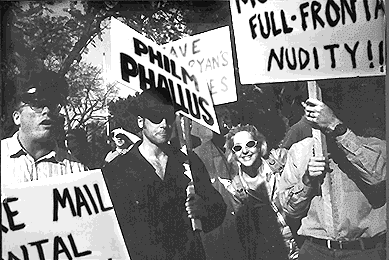
…Sunday's Oscar
orgy included protests and pickets for and against Elia Kazan, as well
as the usual family-value blatherings.But the Cacophony Society took Oscar
night a step further with a protest designed to confuse and amuse.Armed
with signs clamoring for more male frontal nudity ("More Free Willie,"
"Film Phallus," and "Weiners Yearning to Be Free"), the Cacopohonists --
who were saddened when they went to see Saving Private Ryan and Ryan's
privates got left on the cutting-room floor -- let the Academy members
know what they want in a vocal and visual fashion, as well as agitating
the right-wing Xtians who were demanding a cleaner Hollywood....
HOLLYWOOD
REPORTER, March 22, 1999
Protesters may have turned out in droves to rail against Elia Kazan, but have you taken a moment to consider the demonstrators who turned out to voice their demands for male full-frontal nudity?
Although protests have always been part and parcel of the annual Oscar ceremony, this year's outcry against Kazan provided an ideal environment for bringing complaints to the public - however obscure the causes may be.
Some of the placards from protesters Sunday offered familiar homilies along the lines of "Jesus Saves From Hell," but many other groups took the opportunity to present views from the fringe.
A man with a white beard puffed a pipe as he held a sign that proclaimed "Academy Shame: No Oscars for Iran, " but he refused to identify exactly what he was protesting. Did this have something to do with the Iran-produced foreign-film "Children of Heaven" nominee? No, he said. Nor would he say which group had roped him into service: "They won't let me." At that, another man caught the protester's attention with a finger placed to his lips and drew him away.
Not all the protesters were as vague about their intents. Positive Visions, a group that held signs proclaiming sentiments such as "Yo Quiero Hollywood!" was created by Jack Nava to support the placement of Hispanics in film and television. "They don't see themselves on television and movies and don't see it as a possibility," spokesman David Robles said.
Gina Dobbins traveled from San Diego to make herself heard, but her cardboard placard was an enormous cutout of Tom Cruise circa "Jerry Maguire." "It's my 30th birthday and I want to wave at Tom Cruise, " she said.
Pam Anderson, a young woman whose hair reached the base of her spine, held a sign that read "Hollywood, You Support a Rapist." She was referring to reports of a woman's claims that she had been raped by President Clinton.
"Hollywood is still supporting his fund-raisers, " she said. "I just want to skewer their hypocrisy."
However, prurience was praised by More Male Frontal Nudity, a group that carried signs reading "Save Private Ryan's Privates, " "Philm Phallus" and "Free Some Willy. "The group said they turned out in order to get more male members on the screen. "We want to usher in a new, liberating era of male exploitation," said a man dressed as a flasher who would only identify himself as Cameron.
While most of the Kazan activity was taking place at the corner of 1st and Hope streets, several blocks away the director had detractors from the World Socialist Web Site. There, founder David Walsh distributed copies of his treatise "Hollywood Honors Elia Kazan, Filmmaker and Informer."
Across the street, Matthew Hooker supported Kazan as a representative of Artists in Motion, a group devoted to separating art from politics. "His award is long overdue, " Hooker said.
However, his brown cardboard sign was written on both sides with black magic marker: one proclaimed the support for Kazan, while the other asked Demi Moore, Gwyneth Paltrow and Cate Blanchett if he could be their Oscar escorts. "If I get the camera for Kazan, I'll flip it around, " Hooker said.
There was also a polite assemblage from the Ayn Rand Institute-mostly men in suits - who held yellow signs that proclaimed their support of the Blacklist Era director. As a media director handed out press kits while giving interviews via his cell phone, University of Maryland business professor Edwin Locke said, generally, things had been going well for their faction.
"We did have one situation, " he said. "One man picked up a sign until he looked at it and said, "Whoops, I'm in the wrong group."